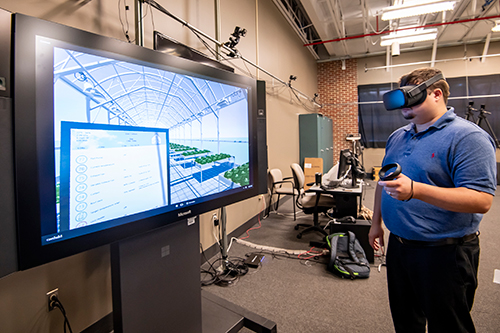
Contact: Alaina Dismukes
STARKVILLE, Miss.—A $500,000 federal grant is helping Mississippi State agriculture students apply virtual reality technology to train for high-tech careers in environmental control.
The U.S. Department of Agriculture award is funding a cross-collaborative project between MSU’s College of Agriculture and Life Sciences and James Worth Bagley College of Engineering that will build virtual reality technology for training students on the use of electronic control software. Environmental control technology is used in state-of-the-art facilities such as greenhouses and similar buildings used for poultry and swine.
“MSU has been teaching electronic control technology for some time, but because real-world facilities are managed only by select authorized individuals, our students couldn’t practice using it first hand,” said Amelia Fox, grant principal investigator and assistant clinical professor in the Department of Plant and Soil Sciences.
Daniel Carruth, MSU assistant research professor in the Bagley College of Engineering and the university’s Center for Advanced Vehicular Systems, also is working on the project.
“Our goal is to give students an opportunity to try out precision agriculture techniques and technologies in a safe, risk-free environment that should allow them to become comfortable with what works and what doesn’t, and with their ability to apply what they learn in the real world,” Carruth said.
Shuchisnigdha Deb, assistant research professor for the Center for Advanced Vehicular Systems, and Carla B. Jagger, assistant professor in the School of Human Sciences, also are part of the team.
Fox explained that the project began with a real-world situation when a former student telephoned from her new workplace.
“She had just started working in Illinois at a swine house—which has environmental control technology similar to that of a greenhouse—and was struggling to use the computer controller,” Fox said.
She helped the former student over the phone but wanted to do more. This led Fox to the idea of expanded training through virtual reality. She sought the support of Wadsworth Control Systems, which produces climate systems for greenhouses, and Chore-Time Brock Inc., owned by Berkshire Hathaway Company, which builds climate systems for poultry houses.
“In the real world, it is impractical to give each student control of their own greenhouse,” Carruth said. “In virtual reality, we plan to give students not only control of their own greenhouse, but also allow them to speed up time to experience how their choices and their use of the environmental controls affect crop growth, profits and so much more.”
Fox wrote the grant proposal, which won funding through USDA’s National Institute of Food and Agriculture. The NIFA grant comes as part of the organization’s Food and Agriculture Cyberinformatics and Tools (FACT) initiative, which focuses on data science to enable systems and communities to effectively utilize data, improve resource management, and integrate new technologies and approaches to further U.S. food and agriculture enterprise.
“It has been almost three years since we came up with this idea, and we are excited to finally see it come to life. It’s going to be so helpful for students,” Fox said.
She said the new, interactive way of learning will benefit not only the students, but the agricultural industry as a whole.
“If someone doesn’t know how to properly use the equipment, it could harm all of the plants in a greenhouse. To impose that risk on a student who is learning is unrealistic and unfair, but they still need to understand how to use this technology,” Fox said.
Carruth said this project is just the beginning of the virtual reality application in education at MSU.
“We absolutely plan to look for other ways to use the models and software that we develop in other agriculture education projects,” he said. “I believe there are applications for virtual reality in many other aspects of agricultural education, distance education, outreach activities and more.”
For more information about the Department of Plant and Soil Sciences in the College of Agriculture and Life Sciences, visit www.pss.msstate.edu. For more about the Bagley College of Engineering, visit www.bagley.msstate.edu.
MSU is Mississippi’s leading university, available online at www.msstate.edu.